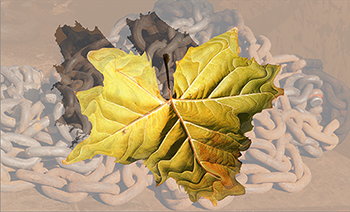Late in his wanderings Odysseus arrived at the shores of the floating Island of Aeolia, land of King Αἴολος. (Which we would spell, Aeolus.) Except there weren’t really shores, since the cliffs of Aeolia were walled with bronze, protection from the constant wind. For in addition to ruling the people of his island, Αἴολος ruled the winds. And those winds were an unruly bunch, numbering not just four, but twelve; sometimes fractiously more.
There was only one place to make a landing and it was like a secret, a narrow cleft in that otherwise impenetrable wall of bronze. Still, Odysseus found it; a fine circular harbor, broad with smooth water and a city rising all around and a gleaming bronze palace well above it. Odysseus arrived worn out, not exactly shipwrecked, though his sails were torn and the ship itself was battered and broken, and his crew dissipated and half starved half mad from nine years of war followed by more at sea.
But Odysseus was a king. It was obvious in his carriage, in the placement of his chin, in the way he placed his feet with each step. No mere mortal, this was King Odysseus. News of his arrival preceded him. Mounting his way to the palace, dressed in rags, leading his rag-tag crew, the instant he appeared at court, that regal aspect was apparent to Αἴολος.
Αἴολος feasted and feted Odysseus. Each night, for a full week, Odysseus told another portion of the story of his travails. Then, when his story had been told, when the week was over, Αἴολος gave Odysseus a fine ship to take him home, to his own island Kingdom of Ithaca. A befitting gift for a heroic king of the stature and prowess of Odysseus. So with great fanfare, with his crew refreshed and laden with gifts, bestowed with a new ship, fully provisioned, Odysseus again set sail for Ithaca.
Amidst all the fuss, the feting, the going away, it seemed incidental. As a going away gift Αἴολος had taken Odysseus and given him a small, brown leather bag tied tightly with a thong. It was unlike anything anyone, neither Odysseus nor his crew, had ever seen. For although it was very small, it was also somehow very full. As he handed it to him, Αἴολος cautioned that Odysseus should not loosen the ties until, “you set foot on your own home shore”. In this way, he sent him on his way and assured them that their safe voyage was certain for, as master of the winds, he would set just one wind blowing steady at his back, “to loft you homeward”. And so they went, Odysseus and his companions.
But that bag. It was so full. It was so tightly tied. It was more like a vein about to burst than any leather bag.
Almost as soon as the ship cleared the harbor walls, slipping out through the cleft of the bronze cliff, Odysseus fell asleep, relieved after years of war and wandering. And although it was not a long voyage, it was long enough for jealousy and envy to infect those companions until their own hearts had swollen to resemble that small bulging bag. “What is this gift that Odysseus will not share with us, his crew? Haven’t we suffered with him equally? Don’t we …”
And that is how it happened. How Odysseus was blown off course yet again, how his travails were destined to continue, how his companions were certain to be lost eventually. As the home shores of Ithaca were finally in sight, just as the smoke from their home hearths tinged their nostrils, just when the men should have been thinking of the return to their families, their lands, their wives … well, it was then that those jealous mutterings became most ripe and, rife with curiosity, the men untied the bag. Fools! Suddenly, eleven winds were unleashed in a furious storm. The ship was taken tearing and twisting and buried in wave after wave after wave.
Startled now from sleep, Odysseus saw the open, empty bag and, cursing his luck, commanded his thieving crew to be sailors, to right the ship. At his word, they cut the shredded sails down, jettisoned the heaving cargo, their fine guest gifts, and in this way their kingly captain saved them all from certain death. But hadn’t he, in the midst of storm, glimpsed, briefly, the near shore of Ithaca, the smoke rising from the chimneys of his own palace? That could have been a dream. He never would know. And they, the crew, his doomed companions, they were too timid to ever admit. Though he did, later, ask. For as the storm cleared, they saw that they were again beneath the bronze Aeolian cliffs. Bedraggled again, faces burned and crusted with salt again, sails torn and cut again, another mast battered, and their guest gifts gone and their stores lost to the deeps of the sea. It was as if they had never left. But they had. Returned to port, they mounted the citadel approaching the court of King Αἴολος.
But seeing them again, Αἴολος was not pleased. No. He blustered with fury. Granting no explanation, Αἴολος, the wind himself, bellowed, “You, Odysseus, oh most cursed of men, leave now from these shores; never to return again”!
And though to say so would have been dangerous, some who were there are said to have said that this was the only time, the once, that wily, skilled, well-spoken King Odysseus scurried.
~jwl
https://www.jonwarrenlentz.com
©®™
2014-0712
